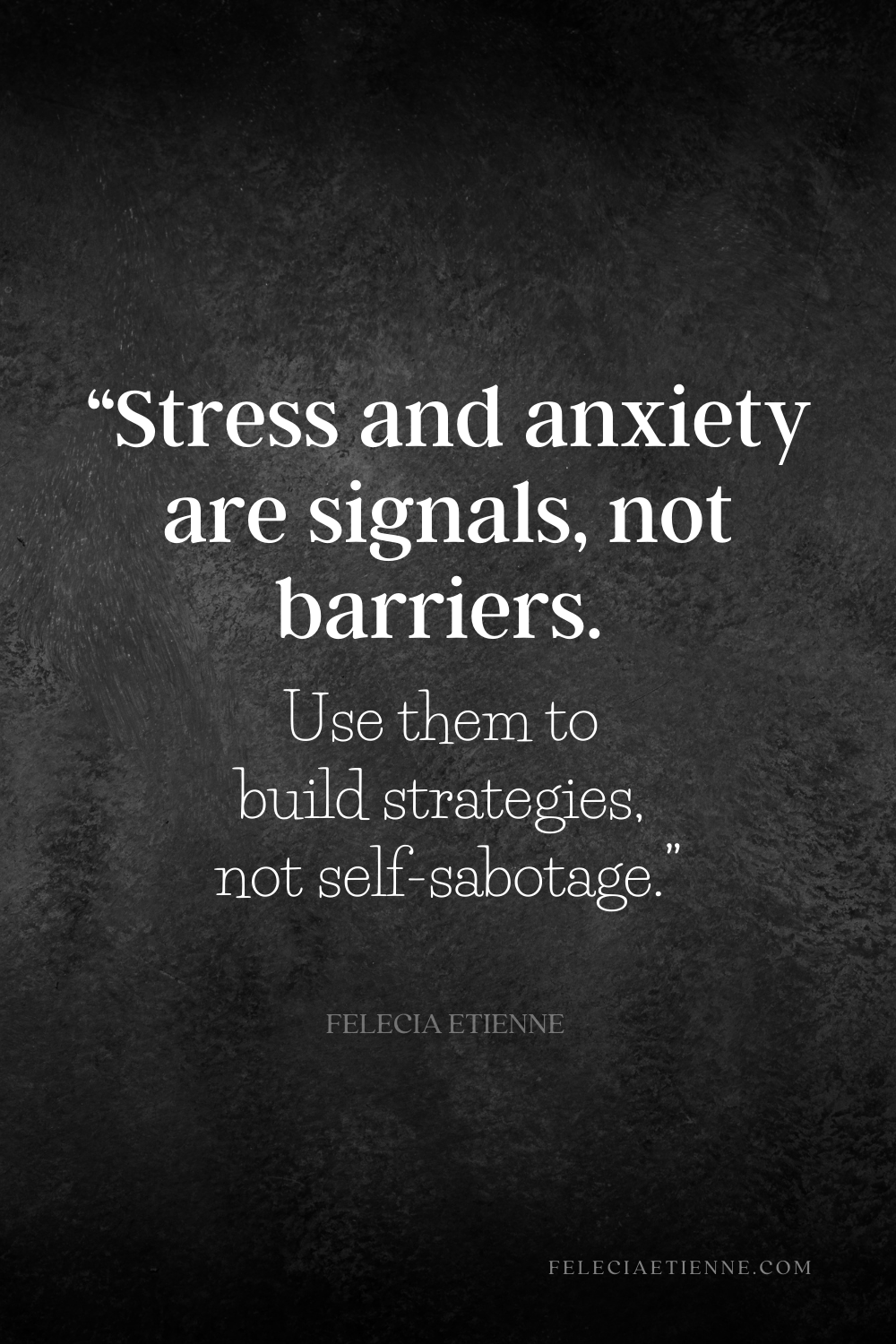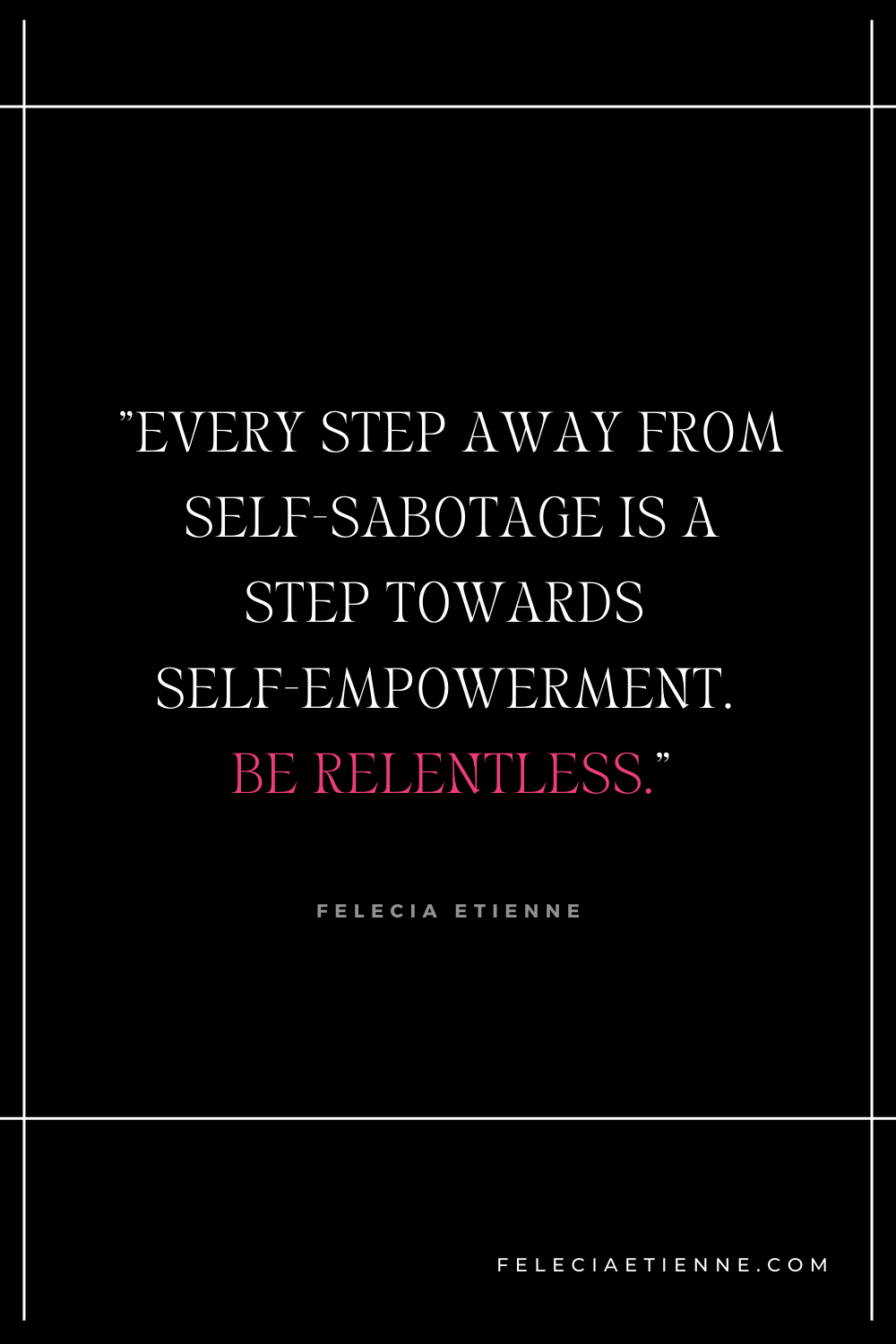Understanding Self-Sabotage: How It Affects Your Well-Being and Ways to Overcome It
Have you ever felt like you were standing in your own way, sabotaging your success and happiness without even realizing it? Self-sabotage is a perplexing and often detrimental pattern of behavior that affects countless individuals, including you. It can undermine your well-being, influencing everything from personal relationships to career advancement and overall life satisfaction.
Imagine waking up every day feeling stuck, knowing that you’re capable of so much more but somehow unable to break free from these destructive cycles. This isn't just about missed opportunities; it’s about the profound impact on your mental, physical, and emotional health. Understanding the underlying causes and mechanisms of self-sabotage is crucial for breaking free and achieving a healthier, more fulfilling life.
According to Dr. Ellen Hendriksen, a clinical psychologist, "Self-sabotage is when we actively or passively prevent ourselves from reaching our goals." This cycle of behavior can feel isolating and defeating, but it’s important to remember that you’re not alone. You can reclaim control over your life by exploring the reasons behind self-sabotage and learning how to counteract it.
Are you ready to discover how self-sabotage might impact your well-being and how to overcome it? Let’s journey toward a future where you can thrive, free from the invisible chains holding you back.
The Nature of Self-Sabotage
“Recognizing self-sabotage is the first step toward reclaiming your power and achieving the success you deserve.”
RELATED ARTICLE: Overcoming Self-Sabotage: Recognizing and Defeating Your Inner Saboteur
Have you ever caught yourself procrastinating on crucial tasks or engaging in negative self-talk? These subtle actions, known as self-sabotage, can silently hold you back from reaching your full potential. High achievers like you might experience this through overcommitting, perfectionism, or even relationship conflicts. Unlike deliberate self-destruction, self-sabotage is often unconscious, making it tricky to recognize.
Think about those times you’ve felt stuck despite your hard work—it’s frustrating. Research shows that self-sabotage can seriously impair your ability to achieve your goals and maintain well-being. Studies indicate that procrastination and negative self-talk are significant barriers to success and happiness.
Understanding and addressing these patterns opens the door to greater possibilities and emotional freedom. Imagine the sense of relief and progress you’ll feel once you break free from these self-imposed barriers. Recognizing self-sabotage is the first step toward reclaiming control and achieving the success you deserve. Taking this step could make your life more fulfilling and balanced.
Differences Between Self-Sabotage and Self-Destructive Behaviors
“When you recognize your self-destructive habits, you reclaim your peace of mind. Choose growth over fear.”
You might often find yourself wondering why you struggle to reach your goals despite your best intentions. Both self-sabotage and self-destructive behaviors can derail your progress, but they differ in intent and awareness. Think about those moments when you’re consciously engaging in harmful activities, like substance abuse or self-harm, knowing they’re damaging—these are self-destructive behaviors. They are more overt and intentional, directly impacting your well-being and peace of mind.
On the other hand, self-sabotage often creeps in unnoticed. It’s unintentional and unconscious. You genuinely want to achieve your goals, but somehow, you find yourself procrastinating, making excuses, or doubting your capabilities. For instance, you might have a big presentation coming up, but instead of preparing, you binge-watch TV shows. This behavior thwarts your efforts and well-being without you even realizing it, leaving you frustrated and stuck.
Research shows that high achievers are especially prone to self-sabotage because the fear of failure can be paralyzing. You might think to yourself, "If I don't try, I can't fail," but this mindset severely limits your potential and well-being. The constant internal battle and resulting stress can take a toll on your mental health.
By understanding these differences, you can start recognizing patterns in your life. Are you consciously making decisions that harm you, or are you unknowingly standing in your own way? The first step to getting past these hurdles is being aware of them.Once you identify the problem, you can take actionable steps to change it and unlock your true potential. Imagine the possibilities when you stop self-sabotaging and start nurturing your well-being—it's within your reach!
Psychological Mechanisms Behind Your Self-Sabotage
“Recognize your worth, challenge your fears, and transform self-sabotage into self-mastery.”
Ever feel like you have one foot on the gas and the other tapping the brakes? You're not alone. The roots of your self-sabotage run deep into psychological processes, often involving fear, anxiety, and deeply held beliefs about yourself. Grasping these mechanisms is crucial to tackling and overcoming your self-sabotaging tendencies.
RELATED ARTICLE: The Top 11 Ways Leaders Unknowingly Self-Sabotage and What to Do About It
Fear and Anxiety
“Break free from anxiety’s grip; step boldly into the life you deserve.”
Fear and anxiety can drive self-sabotage. It's that crippling fear of failing, succeeding, or facing the unknown that makes you act in ways that stop you from taking chances or chasing your dreams. For instance, if you're a high-achieving professional, you might delay crucial projects out of anxiety over not meeting high standards. This procrastination? It's self-sabotage in action. Chronic stress can lead to avoidance behaviors, reinforcing the self-sabotage cycle.
Low Self-Worth
“Unlock your potential by confronting self-doubt; your worth is greater than you realize.”
Low self-esteem and negative self-beliefs lie at the core of self-sabotage. When you doubt your worthiness or capabilities, you might engage in behaviors that reinforce these negative beliefs. Ever feel like you don't deserve love and unconsciously push partners away or create conflicts in your relationships? This behavior confirms your belief that you're unlovable. People with low self-esteem often engage in self-defeating behaviors, perpetuating self-sabotage.
But there's hope. By spotting these patterns and getting to grips with the psychology behind them, you can begin to break free from those self-sabotaging habits. Imagine the possibilities when you confront these fears and start believing in your worth. Addressing these emotional scenes is the first step toward a more fulfilling and successful life.
Real-World Examples of Self-Sabotage
“Don’t let the fear of success keep you from greatness. Rise to the challenge and discover your true potential.”
Self-sabotage can quietly creep into various parts of your life, often without you even noticing. Let's examine some real-world scenarios to better understand its impact.
Career and Professional Life
“Success is not a burden, it’s an opportunity. Embrace it and watch your career soar.”
Ever found yourself missing deadlines or failing to complete projects, even though you have all the skills and resources you need? This might stem from a fear of success and the higher expectations that come with it. By underperforming, you might think you're dodging the pressure and potential scrutiny that success brings. But in reality, you're holding yourself back from achieving greater things and feeling fulfilled in your career. Recognizing this pattern can open doors to new possibilities and professional growth.
Personal Relationships
“True intimacy begins when you stop pushing love away. Embrace closeness to discover deeper connections.”
Have you noticed repeated patterns of conflict or withdrawal in your relationships? Do you sometimes provoke arguments or create distance with your partner because you're afraid of intimacy or abandonment? These behaviors can prevent you from forming deep, meaningful connections, leaving you feeling lonely and dissatisfied. Understanding these self-sabotaging actions can help you build stronger, more fulfilling relationships.
Health and Well-Being
“Step out of the comfort zone and into a healthier lifestyle. You deserve to feel your best.”
Think about your health. Do you neglect self-care, indulge in unhealthy eating habits, or avoid exercise? Perhaps you turn to comfort eating when stressed, leading to weight gain and health issues. Despite knowing the negative consequences, the immediate emotional relief keeps you stuck in this cycle. By acknowledging these behaviors, you can take steps towards better health and well-being, breaking free from the patterns that hold you back.
By recognizing these self-sabotaging behaviors, you can start addressing them and pave the way for a more fulfilling and successful life. You have the power to break free from these patterns and embrace the possibilities ahead. The first step is awareness; from there, meaningful change is within your reach.
RELATED ARTICLE: 11 Powerful Ways to Practice Self-Care so You Can Stay Energized and Focused
The Impact of Stress and Anxiety on Your Self-Sabotage
“Stress and anxiety are signals, not barriers. Use them to build strategies, not self-sabotage.”
You know those days when stress and anxiety seem to take over? Those moments can push you into self-sabotaging behaviors. When you're under significant stress, rational decision-making takes a back seat, leading to impulsive actions that might undermine your long-term goals.
Coping Mechanisms and Workplace Pressures
“The relentless chase for flawlessness can hinder your success. Aim for excellence, not perfection.”
As a high achiever, you often face immense pressure to perform at your best. This can worsen your stress and anxiety. To cope, you might turn to strategies like perfectionism or overworking. But these can lead to burnout and decreased productivity, ultimately sabotaging your professional success. For example, you might work to the point of exhaustion, which reduces your overall effectiveness and increases the likelihood of mistakes.
The Role of Perfectionism in Your Self-Sabotage
“In the quest for perfection, don’t forget to cherish progress.”
Perfectionism is a double-edged sword. It can drive you to excel but also set you up for failure. The relentless pursuit of flawlessness can create unrealistic expectations and chronic dissatisfaction, which are fertile grounds for self-sabotaging behaviors.
RELATED ARTICLE: Procrastination Liberation: 10 Science-Backed Strategies to Crush Perfectionism and Boost Productivity! (Who doesn't want to beat procrastination?)
Procrastination and Avoidance
“Procrastination is perfectionism’s shadow. Shine a light on your potential and take that first step”
If you're a perfectionist, you might procrastinate because you fear your work won't meet your impossibly high standards. This delay can lead to rushed, subpar outcomes, reinforcing your belief that you're not good enough. Avoiding challenges altogether is another common tactic, as the risk of failure seems too great.
Constant Self-Criticism
“Self-criticism is a thief of confidence.”
Harsh self-criticism can erode your self-esteem and increase your stress. This negative self-talk can turn into a self-fulfilling prophecy. Basically, fearing you're not perfect can lead to slip-ups and failures, which just ends up proving your fears right.
Finding Balance and Moving Forward
Remember, it's crucial to find a balance. Recognize when stress and perfectionism are taking over and actively work on healthier coping mechanisms. By addressing these issues directly, you can transform your high-achieving tendencies into strengths rather than sources of self-sabotage.
The Relationship Between Self-Worth and Self-Sabotage
“You are capable of amazing things. Let your self-worth rise above your fears and guide you to success.”
Have you ever wondered why you sometimes trip yourself up just when things are going great? It often comes down to your self-worth. If you're struggling with low self-esteem, you might find yourself doing things that confirm those negative thoughts. It's a tough cycle to break.
Picture this: You've just nailed a major project or hit a big milestone. Instead of patting yourself on the back, you start nitpicking every little detail or put off starting your next task. Sound familiar? You're not alone. High achievers often face this dilemma. The pressure to keep succeeding can sometimes lead to self-sabotage, no matter how much you've accomplished.
But here's some good news: Recognizing this pattern is your first step to freedom. You can break this cycle and tap into your full potential by boosting your self-worth. Remember, you have the power to rewrite your story and truly celebrate your wins.
Confirming Negative Beliefs
“Your thoughts aren’t facts. Challenge your beliefs, celebrate your progress, and rewrite your narrative.”
When you think you're unworthy or incapable, you might unconsciously look for situations that prove you're right. Imagine you're a top performer doubting your ability to lead. You might shy away from taking charge, missing out on opportunities, and reinforcing that nagging feeling of inadequacy.
Dr. Carol Dweck's research shows that a fixed mindset can hold you back. If you believe your abilities are set in stone, you're less likely to tackle challenges, fearing failure and confirming your own doubts. But shifting to a growth mindset can change all that. High achievers who see challenges as chances to grow are more likely to succeed.
So, next time you're doubting yourself, remember: those thoughts aren't facts. They're just beliefs that you can change. Reflect on your past wins, seek out constructive feedback, and embrace new challenges. You have the power to change your narrative.
The Cycle of Self-Sabotage
“Break the cycle of self-sabotage by recognizing your worth. You have the power to change your story.”
Breaking the cycle of self-sabotage is challenging but crucial for your well-being. It starts with recognizing and challenging your deeply held beliefs. Building your self-worth involves practicing self-compassion, using positive affirmations, and seeking support from others. For example, coaching can help you understand why you might have low self-esteem and find better ways to deal with it.
Imagine you're a high achiever, always pushing boundaries and setting new goals. Despite your accomplishments, you might still feel like you're not enough. This feeling can lead to self-sabotage, undermining your success and happiness. You might procrastinate, set unrealistic goals, or engage in negative self-talk. These actions impact your mental health and overall well-being, keeping you stuck in a negative cycle.
To break free, start by questioning the negative thoughts that tell you you're not worthy. Research shows that self-compassion can significantly improve your mental health and overall well-being (Neff, 2003). So, give yourself the kindness you'd offer a friend. Positive affirmations can also rewire your brain to focus on your strengths. Don't hesitate to seek support; therapy has been proven to help individuals uncover the root causes of self-sabotaging behaviors and develop effective coping strategies.
By taking these steps, you're not just breaking a cycle; you're creating a new path filled with possibilities and growth. Imagine the freedom of achieving your goals without the weight of self-doubt holding you back. Your well-being will flourish as you dismantle the barriers of self-sabotage and embrace a more compassionate and positive mindset.
The Impact of Self-Sabotage on Your Well-Being
“Recognize your worth and prioritize self-care to thrive both mentally and physically.”
Self-sabotaging behaviors can severely affect your well-being, impacting your mental fitness, physical health, and emotional stability. Let's dive into how these behaviors might be holding you back and explore what you can do to overcome them for a brighter future.
Mental Fitness
“Mental fitness starts with self-love. Nurture your mind, and watch your success thrive.”
Have you ever felt mentally exhausted from constantly battling yourself or fearing failure? Self-sabotage can lead to chronic stress, anxiety, and depression, making it harder for you to cope with daily challenges. Imagine a life where your mind is free from these invisible chains. Recognizing and addressing these behaviors is crucial for maintaining your mental fitness. According to a study in JAMA Network Open, chronic shared that stress significantly reduces cognitive function. By managing these self-sabotaging tendencies, you can reclaim your mental clarity and resilience.
Physical Health
Self-sabotage can lead to not only mental health issues, but also physical health problems. When we constantly undermine ourselves, it can lead to unhealthy coping mechanisms such as overeating, smoking, or excessive alcohol consumption. These behaviors can have negative effects on our physical health and increase the risk of developing chronic diseases like diabetes and heart disease.
Self-sabotage can lead to unhealthy coping mechanisms like overeating, smoking, and excessive drinking, negatively impacting physical health and raising the risk of chronic diseases.
Financial Stability
Self-sabotage doesn't just affect our mental and physical well-being, it can also impact our financial stability. By constantly doubting ourselves and avoiding challenges out of fear of failure, we may miss out on opportunities for career advancement or financial growth. In addition, self-sabotaging behaviors such as overspending or impulsive purchases can lead to financial struggles and debt.
Relationships
Our relationships with others are also affected.
“Reclaim your mental clarity and physical strength by breaking the cycle of self-sabotage.”
Neglecting self-care, falling into unhealthy habits, and enduring chronic stress can take a major impact on your physical health. You might find yourself struggling with issues like obesity, heart disease, or chronic pain. Picture yourself feeling energized, healthy, and free from these burdens. A report from the American Psychological Association highlights that high-stress levels are directly linked to these physical health problems. Making self-care a priority and finding healthier ways to cope are key moves to boost your physical health and thrive.
Warning Signs: Are You Unknowingly Sabotaging Your Well-Being?
Realizing when you're getting in your own way is the first step towards making some real changes.
Here are 12 signs that you might be undermining your own well-being:
Unhealthy Habits:
Do you find yourself binge-eating or turning to substances to cope with stress? These habits can severly impact your health and productivity, just like the American Psychological Association points out.
Neglecting Self-Care:
Are you skipping exercise, proper nutrition, and sleep? It's easy to fall into this trap, but neglecting self-care can lead to burnout, according to the National Sleep Foundation.
Negative Self-Talk:
Do you catch yourself constantly criticizing your every move? This negative inner dialogue can chip away at your self-esteem and mental health.
Excessive Alcohol Use:
Do you turn to alcohol as a way to relax or cope with negative emotions? It doesn't just mess with your physical health, but can also make any existing mental health issues even tougher to handle.
Ignoring Health Issues:
Are you avoiding medical help for physical or mental health concerns? Ignoring these issues now could lead to even bigger headaches down the road.
Perfectionism:
“Embrace the beauty in imperfection. Perfectionism is just another form of self-sabotage.”
Do you feel like nothing you do is ever good enough? This mindset can leave you feeling burnt out and constantly feeling like you're not measuring up.
Impulsive Behaviors:
Engaging in actions like overspending or taking unnecessary risks might seem exciting but can harm your health. Studies indicate that impulsive behavior is linked to stress and anxiety disorders.
Ignoring Emotions:
Are you bottling up your feelings? Suppressing your emotions can significantly impact your emotional well-being.
Lack of Boundaries:
Struggling to set boundaries? This can leave you feeling overwhelmed and drained. Establishing clear boundaries can significantly improve your work-life balance.
Low Self-Esteem:
Do you often doubt your self-worth? Feeling inadequate can seep into every aspect of your life, from your career to personal relationships.
Avoidance:
Do you find yourself avoiding tasks or responsibilities? Avoidant behaviors can hinder your growth and prevent you from reaching your full potential.
Are you steering clear of difficult emotions or situations? This avoidance can hinder your personal growth and prevent you from reaching your goals.
Controlling:
Do you feel the need to control every aspect of your life? This can lead to anxiety and disappointment. Mastering the art of letting go can dial down stress and crank up your overall happiness.
Overworking:
Do you find yourself constantly working and never taking breaks? This can lead to burnout and negatively impact your physical and mental health. Learning to prioritize self-care and setting boundaries with work can improve your overall well-being.
Overthinking:
Are you constantly overthinking and analyzing every decision or situation? This can lead to unnecessary stress and anxiety. Practicing mindfulness and learning to trust your instincts can help quiet the noise in your mind.
Addressing these behaviors can help you tap into your true potential and lead a more fulfilling, healthier life. Keep in mind, you're in good company—many high achievers encounter these obstacles, and surmounting them is entirely achievable.
Breaking the Cycle of Self-Sabotage
“Self-sabotage is like a virus that can infect every aspect of your life. It’s time to fight back and take control.”
“Every step away from self-sabotage is a step towards self-empowerment. Be relentless.”
Breaking free from self-sabotage requires self-awareness, commitment, and effort.
Here are some strategies to help you overcome these behaviors:
Self-Compassion and Positive Affirmations
“Self-compassion fuels resilience. Treat yourself with the kindness you deserve to unlock your true potential.”
Imagine catching yourself thinking, "I'm not good enough." How about flipping the script to, "I am capable and worthy of success"? Practicing self-compassion and swapping out negative self-talk for positive affirmations can level up your self-esteem and cut down on self-sabotage. Acknowledging your strengths and achievements, no matter how small, can build a more positive self-image. Studies by Dr. Kristin Neff show that self-compassion is linked to greater emotional resilience and well-being. So, why not treat yourself with the kindness you deserve?
RELATED ARTICLE: The #1 tool for Overcoming Imposter Syndrome | Self Compassion
Setting Realistic Goals and Celebrating Successes
“Success is a series of small wins. Celebrate your victories, no matter how seemingly insignificant.”
Perfectionism can paralyze you, but setting realistic, achievable goals can help. Chop up big tasks into smaller chunks and give yourself a pat on the back for every little win. For example, if you're aiming to run a marathon, start with a 5K and gradually increase the distance. Research from the American Psychological Association suggests that small, attainable goals pave the way for long-term success. Each step forward is a win, keeping you motivated and reducing your fear of failure.
Seeking Professional Help
Sometimes, breaking the cycle of self-sabotage needs a little extra help. Therapy can be incredibly beneficial in addressing the root causes of self-sabotage. A coach can help you identify negative thought patterns, offer coping strategies, and support you in building a healthier mindset. If you find yourself stuck in a cycle of self-sabotage, reaching out for professional help can be a game-changer.
Mindfulness and Emotional Regulation
Mastering your emotions and embracing mindfulness can significantly reduce the inclination toward self-sabotage. Techniques like meditation, deep breathing, and journaling manage stress and anxiety, offering healthier ways to cope with tough emotions. More than 200 studies found that mindfulness practices can reduce stress and improve emotional regulation. Give yourself the gift of calm and control.
Building a Support System
Surrounding yourself with supportive friends, family, or colleagues can provide encouragement and accountability. Share your goals and challenges with people you trust who can help keep you motivated and focused on making positive changes. High achievers often benefit from a strong support network that offers both practical advice and emotional support. Remember, you don't have to do it alone.
We often don't realize when we're self-sabotaging, but the effects are far-reaching. It can hinder our personal growth, harm our relationships, and hold us back from reaching our full potential. But with determination and the right strategies, we can break free from this destructive cycle. By incorporating these strategies into your life, you can unlock your full potential. Your journey to personal growth and well-being is within reach!
Conclusion
In conclusion, understanding the intricacies of self-sabotage and its impact on your life is crucial to breaking free from its grip. By recognizing the psychological mechanisms behind these behaviors, practicing self-compassion, setting realistic goals, seeking professional advice, and surrounding yourself with supportive people, you can beat self-sabotage and pave the way toward a happier, healthier life. Remember, self-sabotaging behaviors are not who you are; they are learned patterns that can be unlearned with effort and determination.
Don't give up on yourself or your dreams. Take a deep breath and assess what saboteurs are standing in your way with our quick 2-minute Saboteur Assessment. This small and simple step can make a significant difference. If you need additional support, schedule your free "Unlock Your Performance Edge" session with one of our experts today. Embrace this journey toward a brighter you with open arms, and trust that you have all the tools within you to overcome any obstacle.
Let's break free from self-sabotage together and unlock your true potential for success and fulfillment in life. You deserve it! Act now and take the first step toward reclaiming your well-being today.
Ready to achieve your dream life? I’m Felecia Etienne, your go-to Certified High-Performance Coach™ and Mental Fitness Coach. Let me take you on a transformative journey with a Complimentary Unlock Your Performance EDGE call. This isn’t just a chat—it’s your ticket to the high-performance tools and techniques I’ve shared with my coaching clients.
In this personalized call, you'll:
- Dive into your dreams and goals, tackle obstacles, and bridge the gap between where you are and where you want to be.
- Uncover and combat triggers of self-sabotage while discovering untapped strengths.
- You'll walk away with actionable strategies that deliver immediate impact
Equip yourself with the strategies, resources, and support needed to shatter obstacles, self-sabotaging, narrow the gap, and transform your ambitions into tangible achievements. Ready to escape inertia and boost your impact? Book a private and confidential session. Unlock Your Performance EDGE with Felecia. Let's unlock your potential together.
To find out more about Felecia, you can visit her website at feleciaetienne.com.
Social Media Handles:






























